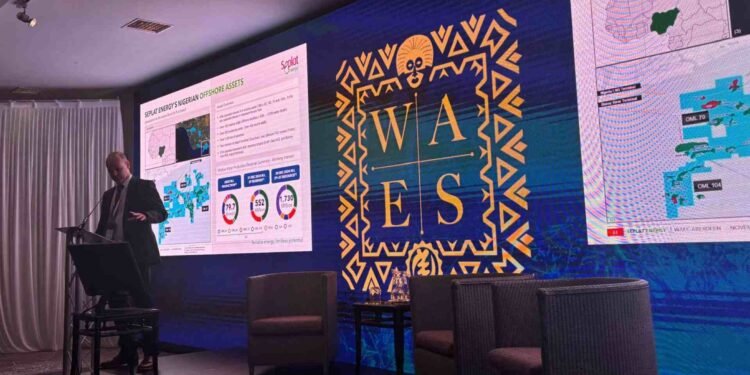Seplat Energy used the Wider African Energy Summit in Aberdeen to present its expanded Nigerian offshore portfolio and to court North Sea service companies, arguing that UK engineering and operational know-how can accelerate development and unlock significant value.
Victor Guatelli, Seplat’s Team Lead for Business Development Technical, led the company’s presentation on Tuesday, outlining both near-term workstreams and longer-term resource potential across four operated blocks acquired from ExxonMobil’s Mobil Producing Nigeria Unlimited in 2024.
The acquisition brought Seplat a 40 percent operated interest in OMLs 67, 68, 70 and 104, adding more than 120 offshore facilities to its balance sheet and creating a cluster with immediate development upside.
The assets include in excess of 200 producing wells, roughly 400 shut-in wells, about 1,500 kilometres of pipelines and an onshore oil export terminal, creating a logistical footprint that Guatelli said can support rapid mobilisation of drilling, subsea and decommissioning services.
He told delegates that the company “sees a lot of incremental volumes,” pointing to nearly 300 shut-in wells with potential, particularly in OMLs 67 and 70, which are characterised as low-cost, high-return targets.
Seplat is prioritising fast-moving opportunities from its inventory of shut-in wells, positioning those prospects as attractive, quick-payback projects for contractors familiar with late-life field interventions.
“We had 400 wells that were shut-in when we completed this deal, and almost 300 of them have potential, mainly in OMLs 67 and 70 low cost, highly profitable, quick payback, highly attractive opportunities for us.”
Victor Guatelli, Seplat’s Team Lead for Business Development Technica
The company has already secured a contract for its first rig, scheduled to start drilling in 2026, and plans to bring between 50 and 70 new wells online by 2030.
Each new well is expected to generate an average of 2,000 to 3,000 barrels of oil equivalent per day, underpinning demand for drilling contractors, well intervention teams and subsea service providers over an extended programme.
Exploration upside and sizable discovered resources

Beyond the immediate drilling pipeline, Seplat outlined significant exploration and appraisal upside.
The company holds more than 20 undeveloped discoveries across the four blocks, which it estimates represent in excess of 500 million barrels of oil equivalent in potential resources.
OML 70 was singled out for particularly strong upside, reflecting both geological promise and logistical advantages from clustered infrastructure.
This exploration inventory, coupled with the shut-in well conversion strategy, offers multiple entry points for engineering houses and project developers seeking medium- to long-term work scopes.
Guatelli emphasised that Seplat’s strategy is not solely oil-focused, highlighting substantial gas monetisation plans that could create additional market opportunities for process engineers and gas-handling specialists.
The company intends to monetise around 700 million standard cubic feet per day through expansions at the Oso Base Plant and phased developments at Oso-BRT and the Yoho Gas Development.
Guatelli said, “If you know Seplat, that’s something we want to focus on. We love developing gas in Nigeria,” signalling strong corporate intent to grow gas production and linked infrastructure.
Comparative scale and technical opportunity

To convey the density of opportunity, Guatelli compared Seplat’s 2P reserves in the four offshore assets to remaining resources in the UK continental shelf, noting that the Nigerian portfolio contains roughly half of the UK’s remaining 2P reserves while exhibiting a resource intensity about 20 times higher.
Those comparisons were deployed to persuade North Sea contractors that skills honed in late-life asset management, drilling performance optimisation, well integrity and well interventions are directly transferable and in high demand on the West African cluster.
Seplat’s Aberdeen presentation framed Nigeria’s shallow-water cluster as a natural extension for North Sea firms seeking growth outside traditional markets.
The combination of immediate shut-in well work, a multi-year drilling programme commencing in 2026, large undeveloped discoveries and parallel gas projects creates a layered pipeline of opportunities spanning short, medium and long-term horizons.
For service providers with deep technical capacity and experience in complex operating environments, Seplat positioned its assets as a platform where engineering expertise can deliver rapid value and sustained contracts.
READ ALSO: No Shield for Wrongdoing — Mahama Sets Sights for Best Model of Accountable Governance























